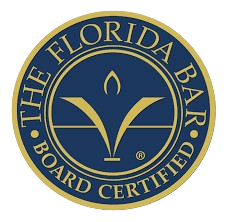Workers’ Compensation in Florida. Know the law.









A work-related injury is one that happened while you were doing something on behalf of your employer or otherwise in the process of your employment. Work-related injuries can occur both at the workplace and also may happen outside the company property. For example, if you are injured on a truck or at other work-related locations, that also can be considered for a Workers’ Compensation claim, as long as you were an employee doing something associated with the job. The workplace or work environment must have directly contributed to the injury in concluding whether the injury can be considered work-related.
Additionally, if an injury occurred on the job and is considered work-related, third parties, not the employer, may also be responsible for causing the injuries and should be considered in determining whether you have a claim and against whom. For instance, if you were injured in a car crash while driving a work vehicle, you could potentially have a claim against the at-fault for driver for negligence and one with your employer for workers’ compensation benefits.
At Rader Law Group, we are dedicated to helping the victims of work-related accidents recover substantial amounts of money to help them get their lives back on track. If you have been injured on the job, contact us today for a free consultation to learn more about your rights and against whom you could potentially bring your claim.
Workers’ compensation is insurance that an employer purchases to cover injuries to their employees at work. Workers’ compensation is designed to pay the medical expenses and a portion of the lost income people incur when they have been injured at work. This can include general medical bills, rehab/physical therapy, prescription medication, travel expenses related to treatment for your injuries, in the past and potentially in the future if an authorized physician finds that you have a permanent and qualifying condition.
Workers’ compensation is its own unique system of compensation separate and apart from the world of negligence and the civil justice system. Florida has a specific set of statutes governing workers’ compensation. There are many key differences between a claim for negligence against a responsible party –like a car crash or trip and fall – versus a claim against your employer. When you are injured at work, you cannot just sue your employer. The workers’ compensation system is usually triggered automatically.
In a claim for a work-related injury against your employer, you do not need to prove fault or liability, just that the injury occurred within the course and scope of your employment, meaning while you were performing your job. Your employer and their workers’ compensation insurance carrier, upon notice of the claim, will then normally arrange for you to see a medical provider and get the care you need. Most often, you cannot choose your doctor and the care you need must be authorized by the workers’ compensation insurance carrier.
Employers conducting work in the State of Florida are required to provide workers’ compensation insurance for their employees. Specific employer coverage requirements are based on the type of industry, number of employees and entity organization.
As an example of some of the requirements for various industries, Florida’s Department of Financial Services states:
Employers with one or more employees, including the owner of the business who are corporate officers or Limited Liability Company (LLC) members, must have workers’ compensation coverage.
Generally, employers with four (4) or more employees, including business owners who are corporate officers or Limited Liability Company (LLC) members, must have workers’ compensation coverage. Section 440.02 of Florida’s Workers’ Compensation law defines an employer and an employee. A sole proprietor or partner engaged in the non-construction industry who employs three or fewer full or part-time employees is NOT required to obtain workers ‘ compensation coverage. In addition, the sole proprietor or partner engaged in the non-construction industry is NOT included in the employee count for determining whether the non-construction business is required to obtain workers’ compensation coverage. However, if the sole proprietor or partner engages in a construction-related activity as defined in subsection 440.02(8), Florida Statutes, or in Rule 69L-6.021, Florida Administrative Code, the business must comply with the workers’ compensation coverage requirements for the construction industry.
Employers with six (6) regular employees and/or twelve (12) seasonal workers who work more than 30 days during a season but no more than a total of 45 days in a calendar year must have workers’ compensation coverage.
There are many other requirements and exemptions, so it is important to contact an attorney who understands the requirements of the law.
We recommend you pursue a claim soon after your accident as there are certain time limitations on how long you have to file a claim. Our team of experienced litigation attorneys are available to discuss your potential claim for your on-the-job injury. Contact us at (954) 913-CASE (2273) for a free consultation.








For a Free Case Evaluation
For you, this is everything. You were wronged and it wasn’t your fault. At Rader Law Group, we know this. We know that every case we handle represents your life. The path to justice is an emotional one. You are angry and were wronged, and it is our responsibility to protect you and to insist that you get the justice you deserve. With decades of experience, we take those duties very seriously.
quick links
Areas of Practice
Coral Springs
Deerfield Beach
© 2025 Rader Law Group. All Rights Reserved.
Disclaimer: Past results are not a guarantee that we will be able to obtain a similar result for your case since each case is unique. Results represent gross judgement or settlement before any applicable post trial reductions and set offs, the payment of attorney fees, costs, Medicare, Medicaid and medical liens. All results are reflective of judgements or settlements obtained by an attorney at Rader Law Group, and may have been obtained before joining Rader Law Group.